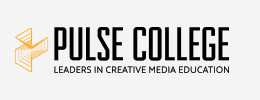BA (Hons) in Audio and Music Technology

Course Overview
Learn the skills required to succeed as a modern day Audio Professional with this unique, industry-focused programme
Aimed at musicians, DJs, computer music hobbyists, and general lovers of music,
this programme will equip you with the skills required to succeed as a modern-day
audio professional.
It is currently essential to be skilled in an array of disciplines and areas to become
successful in the audio industry. These areas range from an understanding of
recording studios, live venues, TV and radio, post-production, to the nuances of live
performance.

Why Study Audio and Music Technology at Griffith College?
Our partnered BA (Hons) in Audio and Music Technology is available on a full-time basis over a three-year period and taught on campus at Pulse College. The course will introduce you to how to record and produce music both in the home studio and in large recording studios where you will learn about live sound from both a performance and technical perspective. Our students will also be trained in the iconic Windmill Lane Recording Studios and will be required to put on live shows and performances throughout the duration of the course.
- Taught by passionate industry professionals to an international industry standard
- Students will have access to state of the art facilities
- Guest lectures from industry professionals
- Use of industry relevant software applications including Apple Logic Pro Certified Centre and Avid Pro Tools Centre
- 24-hour studio access
Intake Dates
- Dublin - Full-Time - February 2026
- Dublin - Full-Time - September 2026
- Dublin - Full-Time - February 2027
What our students say

The modules really complement each other and prepare you to be a capable audio professional. The college provides top-class facilities and everyday I spend in college, the more passionate I feel about Audio and Music.
BA (Hons) Audio and Music Technology
Course Details
Click on the Course Modules below for a greater insight into the course.
Course Modules
Music Technology
This module covers basic principles of modern music technology. You will explore drum programming, samplers and VSTs. You will also learn how to set up the hardware and software of a music production suite and learn to record, edit and mix using computer based programmes.
Applications Technology
You will be trained in the use of industry standard DAW software (Pro Tools and Logic Pro X). The curriculum and assessment is based on the official vendor programmes.
Recording Studio Principles
You will be introduced to the operating principles of modern recording studios and the issues in operating a recording system from microphone choice and placing techniques to basic editing and mixing techniques for final mix down.
Music Theory/Aural Training
You will develop your understanding of musical theory, analyse musical structure and form (from Rock and Pop music to Classical and Jazz) and Aural Training skills. You will develop your notational skills using Sibelius notation software to convey musical ideas to musicians with musical vocabulary.
The Music Industry
You will get a broad understanding of the music industry, its various roles and structures within the industry; the commercial, the regulatory environment, and the wider music culture.
Sound Reinforcement
You will be introduced to the theory, techniques and practices involved in implementing appropriate sound reinforcement for a live performance event.
Critical Listening & Audio Analysis
You will be introduced to the principles of sound, estimating changes in sound frequency, sound level, band limitations and irregularities, distortion, noise, etc.
Advanced Music Technology
You will gain further knowledge in this area, conducting research into virtual instruments and doing an in-class group presentation.
Music Production And Recording
You will develop your recording skills to a professional industry standard including pre and post-production elements, recording large acoustic ensembles, You will manage the studio environment with an orchestra or large ensemble, and develop your communication skills required to liaise with clients.
Sound Design
During this creative module, you will be required to develop sounds for a range of environments (machine, underwater, space) and how to use processing techniques to enhance and deliver your soundscapes and ideas.
Advanced Music Theory/Aural Training
You will develop your understanding of musical theory, analyse musical structure and form (from Rock and Pop music to Classical and Jazz) and Aural Training skills. You will develop your notational skills using Sibelius notation software to convey musical ideas to musicians with musical vocabulary.
Advanced Sound Reinforcement
You will acquire the foundational skills required to design, configure and calibrate a P.A. System to professional standards. Utilising prediction and analysis software, you will develop system engineering skills and plan and realise a live event.
Live Music and Performance Technologies
During this module you will be introduced to the technical aspects of live performance. You will work with stage set-ups and learn about the connectivity between music technology software and performance hardware.
History of Music Production and Recording
You will work in the role of a modern music producer utilising technical and interpersonal skills to facilitate a project from pre-production to completion.
Dissertation
You will work closely with a tutor to complete a large body of work. This project is led by you and may focus on any area worthy of academic research. You will further develop your skills in critical thinking and put your creativity into practice.
Advanced Music Production and recording
You will develop your recording skills to a professional industry standard including pre and post-production elements, recording large acoustic ensembles, You will manage the studio environment with an orchestra or large ensemble, and develop your communication skills required to liaise with clients.
Studio Designing Installation
You will gain practical and theoretical knowledge in the design and setup of a recording studio environment. You will learn how to capture and analyse acoustic information for a given environment and develop acoustic solutions to issues identified.
Professional Practice
You will learn self-marketing skills and the legal and ethical issues pertaining to the world of music/audio, all of which are required to set up your own business and trade as freelance/sole trader professional.
Sound Design for Games
You will be equipped with the theory and practical knowledge to provide audio content for games and interact with the industry middleware and audio engines. This will be developed incrementally to help the learner in the creation of dynamic sound environments that interact directly with the game software.
Live Events and Audio Streaming Technologies
You will gain further knowledge on how live performance systems can be programmed and performed and the skills needed to plan and realise a live performance.
Audio Post Production Techniques
Having already developed considerable recording experience, you will focus your skills into the area of post-production. You will learn about the standards and practices to deliver products for film and TV to industry specifications.
Timetables
Timetables TBC
How to Apply
Entry Requirements
We expect all applicants to have a proven interest in audio and/or music technology, and to display some interest in related creative media arts. Knowledge of the basic use of computers (either Mac or PC) and music/audio software will be helpful, but not essential before starting the course. It is a definite advantage to demonstrate your passion for audio, i.e. playing in a band, DJ-ing, recording or making music at home. A willingness to explore new ideas is important alongside a positive attitude this creative field of study.
Irish Citizen Under 23 Years of Age
Entry onto our Programme is based upon a course interview and achieving a minimum of:
2x H5s (H5 = 50 – 60% in a Leaving Certificate Higher Level subject)
and
Minimum of 4x O6/H7s (O6 = 40 – 55% in a Leaving Certificate Ordinary Subject / H7 = 30-40% in a Leaving Certificate Higher Level subject)
To include a minimum O6 or higher in Ordinary Leaving Certificate Mathematics and either Irish or English
Or:
FETAC Level 6 / HETAC Level 7 in Music/Media or similar
Or:
a Minimum of 2 Grade C A Levels as well as 4 subjects from either A levels (Grades A-E) or GCSE (Grades A,B or C). Or NVQ Level 3 in Music/Media or similar.
Additionally, we expect applicants to conform to a number of the following criteria:
-
Basic knowledge of computers (MAC/PC, and audio software): helpful but not essential
-
The ability to devise original work across a variety of media
-
Extra-curricular activity, such as band performance, DJ-ing, community arts, visual or performing arts
Applications from individuals with non-standard qualifications and relevant work or life experience will also be considered.
English Language
Griffith College is accepting the online Duolingo English Test (DET) as valid proof of English proficiency. For more information, please visit here.
How to Apply
Applicants must apply to Griffith College directly online using the Apply Online facility. All applicants will have to complete an interview with Pulse College.
Applicants under 23 years of age:
- Photo ID (passport/driving licence)
- GNIB card or Irish Residence Permit if applicable
- Leaving Certificate/High School diploma results
Applicants over 23 years of age (Mature students):
- Photo ID (passport/driving licence)
- GNIB card or Irish Residence Permit if applicable
Fees
For purposes of fee calculation, residence is counted from time of application.
If you have any questions about fees, please contact Pulse College directly.
Please note that not all study modes may be offered at all times; for confirmation, refer to the Intake dates on the Overview tab.
Tuition Fees
Study Mode: Full-Time
Dublin: EUR 9,850.00
Study Mode: Full-Time
Please refer to the Irish/EU Living Abroad Fees section.
Study Mode: Full-Time
Dublin:
Non-EU living in Ireland or abroad: Please refer to our Non-EU Tuition Fees section.
Non-EU students: a Student Services and Administration fee of EUR200 is payable each academic year in addition to the fees quoted below.
Flexible payment options
Students wishing to pay their fees monthly may avail of our direct debit scheme. Please view our Fees information page for more information and assistance.
Sponsorship
Is your company paying for your course?
They will need to complete a Griffith College Sponsorship Form and send this to the Student Fees Office:
- Post: Student Fees, Griffith College Dublin, South Circular Road, Dublin 8
- Email: [email protected]
2% Learner Protection Charge
All QQI accredited programmes of education and training of 3 months or longer duration are covered by arrangements under section 65 (4) of the Qualifications and Quality Assurance (Education and Training) Act 2012 whereby, in the event of the provider ceasing to provide the programme for any reason, enrolled learners may transfer to a similar programme at another provider, or, in the event that this is not practicable, the fees most recently paid will be refunded.
QQI Award Fee
Please note that a QQI Award Fee applies in the final year of all QQI courses. To find the relevant fee for your course level, please see the Fees page.
Progression
Academic Progression
Graduates of the BA (Hons) in Audio and Music Technology course may be eligible to advance to progress to postgraduate programmes.
Career Progression
Graduates of the BA (Hons) in Audio and Music Technology will have a good basis for a future career in an industry-based profession such as a sound engineer, audio editor or music producer.


